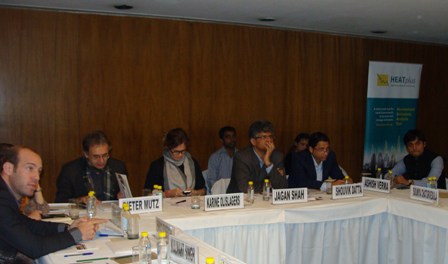Project Advisory Group provides essential takeaways for the Urban LEDS project

Held at the India Habitat Centre, New Delhi, on 5 February 2014, the First Project Advisory Group (PAG) meeting of Promoting Low Emission Urban Development Strategies in Emerging Economy Countries (Urban LEDS) witnessed the participation of representatives from esteemed organisations like Kfw (German Development bank), GIZ (Deutsche Gesellschaft für Internationale Zusammenarbeit GmbH), UN-Habitat, Ministry of New and Renewable Energy (MNRE), National Institute of Urban Affairs (NIUA), the European Commission and Schneider Electric India Pvt. Ltd. The Project Advisory Group will advice ICLEI South Asia on strategic directions to take forward the Urban LEDS project through the provision of expertise, experience, engagement, advocacy, policy support and partnerships.
Mr. Emani Kumar, Executive Director of ICLEI South Asia, opened the meeting and gave a brief introduction about ICLEI South Asia’s work and mission to help city governments achieve their sustainable goals, followed by a brief description of the activities of the Urban LEDS project and achievements so far.
The meeting aimed at updating the PAG about the progress of the project, at getting their inputs and at looking for synergies and support in Urban LEDS’ ongoing work. Mr. Jagan Shah, NIUA, rightly said, “This meeting aims at looking forward to an integrated view on developing the urban sector without the need for duplicating previous views or actions.”
The PAG looked upon the scenarios of working with cities – the pros and the cons of it. Data collection and validation, lack of support from the local bodies etc. emerged as some of the challenges of working with local governments. However, as Soumya Chaturvedula, Senior Manager, ICLEI South Asia, correctly stated, “Cities do have challenges but they have tremendous opportunity as well.”
The members of the PAG came up with myriad suggestions and ideas so as to make working in cities an easier and more efficient task for the Urban LEDS project:
- Identifying priority sectors of each city depending on their size and population and trying to expand to new sectors, in addition to the traditional ones (e.g. looking also at buildings, and not only at transport and water supply) was the recommendation of Dieter Mutz, from GIZ. His colleague Enrico Rubertus added that it would be beneficial to link local actions to the state and national level action plans.
- Introducing and involving schools and other educational institutions in policy-making and in designing action plans, by including programmes like energy efficiency awareness into their curriculum, was the suggestion of Jagan Shah, Director of NIUA.
- Usha Rao, from Kfw, highlighted the need to invest private sector money in low carbon actions, by saying “In an urban world, it is crucial to have the support of the private sector.” The relevance of involving local business, as well as local academic institutes as neutral parties, was reinforced by Amresh Deshpande, Schneider Electric India Pvt. Ltd.
- A.K. Tripathi, from MNRE, commented that cities should be made aware of the list of existing schemes that they can avail of and that such a compendium should be prepared during the project. He also encouraged ICLEI South Asia to come out with strong policy/project recommendations, which can then be implemented with support from the Central Government or city funds
- Kulwant Singh, from UN-HABITAT, reinforced the idea of having the elected representatives of the city involved in the making and incorporating of the action plans. He also highlighted the benefits of a regular sharing of project related information, through periodic newsletters and semi-annual PAG meetings.
The PAG acknowledged that such a project brings to the forefront first generation interventions, and praised the project partners for creating an immense platform covering all important aspects needed to build and develop a sustainable environment and for creating awareness among people of the need to shift to low emissions development.
In his final comment, Mr Tripathi from MNRE encouraged ICLEI South Asia to keep up the good work and sensitize local governments “Show them what is happening, show them what you will do for them!”
For further information on the Urban LEDS project, visit:
To follow Urban LEDS India activities, visit:
